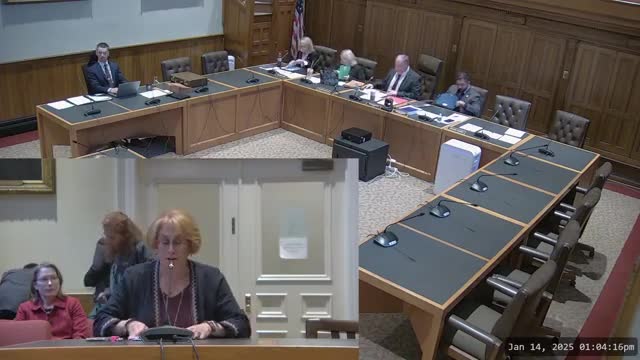N.H. Senate Judiciary hears bill to raise penalties for driving 100+ mph
Get AI-powered insights, summaries, and transcripts
Subscribe
Summary
A Senate Judiciary public hearing on SB 41 drew New Hampshire State Police testimony about rising extreme-speed incidents and a sponsor outline of fines and license revocations proposed for drivers clocked at 100 mph or more.
Sen. Regina Bartzel, sponsor of Senate Bill 41, told the Senate Judiciary Committee on Wednesday that the bill responds to what the Department of Safety and law enforcement described as an increase in extreme-speed driving on New Hampshire highways.
Bartzel, state senator for District 19, said the bill would treat driving at 100 miles per hour or greater as a specific violation with a minimum fine and license-suspension ranges. "If you are seen as driving a vehicle at a speed of a 100 miles per hour or greater, you will be guilty of a violation and fine not less than $750, plus a penalty assessment for the first offense, a $1,000, plus penalty assessment for a subsequent offense, and, their license or operating privilege shall be revoked for a period of 90 days, and for a second offense, from 90 days to 1 year 1 year for subsequent offense," Bartzel said during the hearing.
Capt. Matt Amatucci of the New Hampshire State Police described data the State Police have compiled showing growth in reckless-driving enforcement and in incidents involving speeds over 100 mph. Amatucci said his unit's longer-term tracking showed only a handful of violators in the mid-2010s compared with larger counts in recent years: "So back in 2015, there were over 5,000 motor vehicle stops that were conducted. Only 23 of them for driving in excess of 100 miles an hour ... over the last, decade, we've seen an increase in, speeding operators, specifically those traveling in excess of 100 miles an hour," he said.
Amatucci provided year-to-year totals from more recent records and argued that increasing the minimum penalties could act as a deterrent. Committee members asked about the choice of a 100-mph threshold and about whether data distinguish in-state from out-of-state drivers; Amatucci said the threshold was selected to align with existing reckless-operation language and that the office did not have statewide residency breakdowns available at the hearing.
Committee members and witnesses characterized the bill as one piece of a broader safety approach. Bartzel and Amatucci said penalties alone would not solve reckless driving but could be a tool to reduce extreme-speed behavior when paired with other enforcement and public messaging.
No formal committee action or vote was recorded during the public hearing portion of SB 41 at this session.
